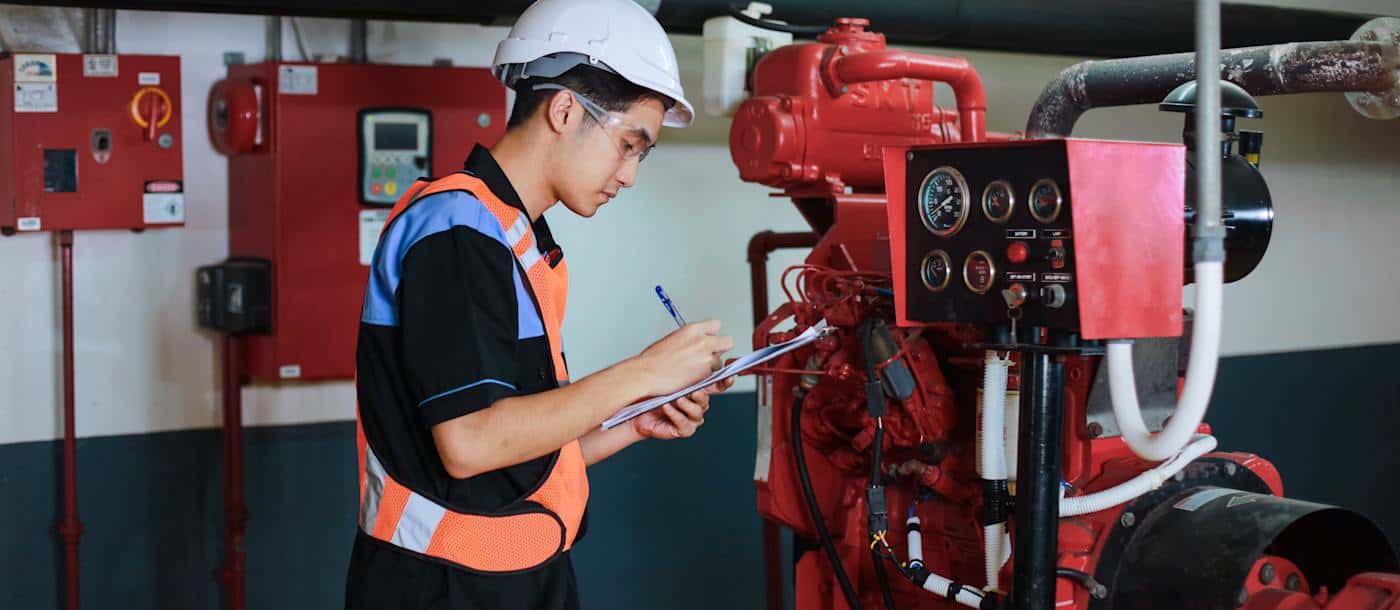Electrical technician courses in our program are designed with industry in mind, utilizing real-world equipment and taught by instructors with experience.
Once you graduate, you'll be ready to apply for entry-level roles in a range of fields.130
Keep reading to learn more about the curriculum and what to expect in our Electrical, Electronics & Industrial Technology (EEIT) program.
Electrical, Electronics, & Industrial Technology Program Overview
Our Electrical, Electronics, and Industrial Technology program takes a year to complete. Training is designed to help students prepare for entry-level roles in fields like residential and commercial, fire alarm systems, intrusion detection, entertainment, energy management systems and more.
This training prepares graduates for a range of career paths to pursue, including electrician's assistant, fire alarm technician, cable technician, security + access control systems technician and more.77
Electrical Technician Courses Overview
The Electrical, Electronics, and Industrial Technology program covers a range of topics, providing students with a foundational knowledge of electrical fundamentals, electronic systems and industrial manufacturing equipment and technology.
Students enrolled in the program will take electrical technician courses like the following (course titles and descriptions are subject to change):
Introduction to Technical Trades
This course helps teach students fundamental knowledge and skills for electrical and electronic industries, including basic concepts and methods used in performing the electrical and low voltage technician's tasks.
Applied Math and Measuring Tools
Students will utilize basic mathematical skills as well as the dimensional inspection and use of precision measuring tools. Students will also have the opportunity to gain two nationally recognized certifications, from the American Heart Association (AHA) for CPR and AED use, as well as the OSHA 10 certification for workplace safety.
Electrical Wiring
This course aims to equip the student with residential and commercial wiring principles. Students will also be introduced to different components of motor control centers, lamps and lighting fixtures, fuses and circuit breakers and more.
DC Electrical Theory
In this course, students will learn direct current (DC) electrical theory and applications. This course is designed to teach students electrical circuit schematics and diagrams including charging and storage functions.
AC Electrical Theory
In this course, students will learn single phase, alternating current (AC), electrical theory and principles, and their application to energy technology and power generation systems.
Electrical Applications
In this course, students will be taught about the fundamental concepts used in residential and commercial structures. Basic blueprint concepts will also be introduced.
Advanced Electrical and Controls
In this course, students will utilize the prior learning from DC and AC Electrical Theory for advancing their knowledge of more sophisticated electrical circuits troubleshooting electrical controls like Programmable Logic Controllers (PLCs), Variable Frequency Drives (VFDs) and 3-phase power usage.
Electrical and Electronics Troubleshooting
This course is designed to provide students with a comprehensive understanding of the functions of various electrical and electronic system control circuit components. Throughout the course, students will learn about control circuit troubleshooting procedures and the devices and components utilized in motor control systems.
Computers and Networking
The focus of this course is to help students identify and troubleshoot basic PC hardware and software components. The course will also cover the use of computer applications in low-voltage industries, including installation and configuration of application software.
Programmable Logic Controllers
In this course, students will use obtained knowledge from prior course content to build up their programming foundations to an industrial control level. Programming will be explored in reference to industry specific control applications such as manufacturing and process control along with additional practical applications.
Instrumentation and Control
In this course, students will be introduced to instrumentation and control theory, design, components and applications. This gives the students an initial look into functional control loops, sensors and transducer calibration. Students will learn the processes involved with monitoring and controlling of equipment.
Industrial Robotics
This course will introduce students to the industrial robots, basic programming methods, safety and maintenance involved with these robots. Students will learn the benefits and needs of integration into robotic systems along with the basics of tools need to do the integration.
Hydraulics and Pneumatics
In this course, students will learn about hydraulics, pneumatics, belt drives, gear drives and a variety of other mechanical systems.
Mechanical Systems & Maintenance
This course will build upon many of the skills learned throughout the program. In this course, students will continue to learn about electrical and mechanical relationships and connection used in the electrical mechanical engineering domain with emphasis on industrial and manufacturing applications.
Our Electrical Technician Classes Can Help You Prepare for a Career
Technicians work in many vital fields, and our Electrical, Electronics, & Industrial Technology program covers a range of topics that can help prepare students for careers in different industries.
Our training provides hands-on practice and a foundation of knowledge that can be built upon in the field.
FREQUENTLY ASKED QUESTIONS
Training in our Electrical, Electronics, & Industrial Technology program takes one year to complete.
Students in the EEIT program will have the opportunity to gain a CPR/AED use certification from the American Heart Association as well as the OSHA 10 certification for workplace safety. Students also receive National Center for Construction Education and Research (NCCER) credentials.130
All courses in the EEIT program teach students hands-on in labs that mirror the industry. The same tools and tech that are used in the field are what instructors utilize to help train students.
The Electrical, Electronics, & Industrial Technology program is a fully in-person program, as students are learning concepts hands-on in labs.

